(完整版)人教版高中英语必修语法知识点总结
人教版高中英语必修三语法总结

人教版高中英语必修三语法总结高中英语必修三语法主要考点有情态动词、名词性从句、同位语从句等,下面是具体的高中英语必修三语法,仅供参考。
1英语必修三有哪些语法要学考点一情态动词(unit1,unit2)一、情态动词的特点:1.没有人称和数的变化。
2.有些情态动词有过去式的变化:e.g.will→would,can→could,may→might,dare→dared二、情态动词的否定式:情态动词+not+动词原形cannot:can’t,mustnot:mustn’t,neednot:needn’t三、情态动词的用法及相互区别,是考试的内容之一1.can,beabletobeableto表示经过努力后,能够做到;beableto有多种形式的变化。
can1).表示体力或脑力方面的能力;2).表示允许、可能性。
could是can的过去式,表示过去有能力及过去存在的可能性;用于疑问句表示委婉地提出问题。
1)Thefirespreadthroughthehotelveryquicklybuteveryone____getout.(NMET97)A.hadtoB.wouldC.couldD.wasableto2)-Willyoustayforlunch?-Sorry,__.Mybrotheriscomingtoseeme.(NMET99)A.Imustn’tB.Ican’tC.Ineedn’tD.Iwon’t2.may表示询问或说明一件事可不可做;表示某事有可能发生。
might是may的过去式;用在疑问中比may委婉、客气。
1)-MayItakethisbookoutofthereading-room?-No,youmustn’t.(Yes,youmay.)2)-MightImakeasuggestion?-Yes,youmay.3.must1).表示必须要做的事:必须2)表示很有把握的推断:一定,准是。
have(has)to:have(has)gotto必须,不得不。
人教版高中英语必修3 五个单元语法知识点汇总
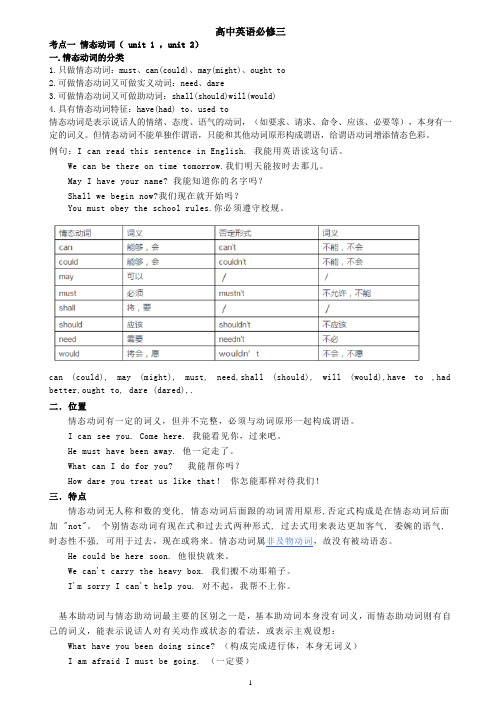
高中英语必修三考点一情态动词( unit 1 ,unit 2)一.情态动词的分类1.只做情态动词:must、can(could)、may(might)、ought to2.可做情态动词又可做实义动词:need、dare3.可做情态动词又可做助动词:shall(should)will(would)4.具有情态动词特征:have(had) to、used to情态动词是表示说话人的情绪、态度、语气的动词,(如要求、请求、命令、应该、必要等),本身有一定的词义。
但情态动词不能单独作谓语,只能和其他动词原形构成谓语,给谓语动词增添情态色彩。
例句:I can read this sentence in English. 我能用英语读这句话。
We can be there on time tomorrow.我们明天能按时去那儿。
May I have your name? 我能知道你的名字吗?Shall we begin now?我们现在就开始吗?You must obey the school rules.你必须遵守校规。
can (could), may (might), must, need,shall (should), will (would),have to ,had better,ought to, dare (dared),.二.位置情态动词有一定的词义,但并不完整,必须与动词原形一起构成谓语。
I can see you. Come here. 我能看见你,过来吧。
He must have been away. 他一定走了。
What can I do for you? 我能帮你吗?How dare you treat us like that!你怎能那样对待我们!三.特点情态动词无人称和数的变化, 情态动词后面跟的动词需用原形,否定式构成是在情态动词后面加 "not"。
个别情态动词有现在式和过去式两种形式, 过去式用来表达更加客气, 委婉的语气, 时态性不强, 可用于过去,现在或将来。
人教版高中英语语法总结大全(615页)

n.[U]苦恼;[C]让人痛苦的事
upsetting.upsetting→upset
13.power n.[U]能力;力量;权力→(熟词生义)提 3.You will ignore of the bell and go
供动力→powerful adj.强大的;有力的→(反义
somewhere quiet to calm your friend.去
to think that you may get annoyed with me. 6.(2017·北京卷)That's exactly (exact) what is happening in small neighborhoods around the country. Ⅱ.教材与单句改错(每题最多 2 处错 误) 1.I would be gratefully if you could give me some advices.gratefully→grateful; advices→advice 2.Your friend comes to school
词)powerless adj.无力的;没有能力的
掉 of; friend 后加 down
14.disagree vi.不同意→(反义词)agree vi.同意 →agreement n.[U]同意;[C]协议 15.dislike n.& vt.不喜欢;厌恶→(反义词)like vt. 喜欢 阅读单词 16.survey n. 调查;测验 17.loose adj. 松的;松 开的
6.a series of 一连串的;一系列;一套 7.on purpose 故意地;有目的地 8.in order to 为了……→(同义短语)so as to 9.at dusk 在黄昏时刻
(完整版)人教版新课标高中英语各单元重点知识内容梳理

人教版新课标高中英语各单元重点知识内容梳理年级教材单元重要句型重点语法命题趋势Unit 1it 强调句结构Unit 2even if 引导的让步状语从句直接引语变间接引语单项选择题中侧重对语序与引导词的考查Unit 3主语+ be +形容词+动词不定式现在进行时态表将来单项选择题中考查该时态在具体语境中的灵活运用Unit 4as if 状语从句It is no wonder that 从句关系代词that, which, who, whom, whose, as引导的定语从句必修1Unit 5There was a time when 从句关系副词when, where,why 引导的定语从句定语从句是高中英语的重点内容,单选、完型以及短文改错均会涉及,而阅读材料中也会大量出现Unit 1There is nodoubt that 从句非限制性定语从句非限制性定语从句的关系词,as 与which 引导时的区别Unit 2the+adj.比较级,the+adj.比较级一般将来时的被动语态Unit 3as 引导的状语从句现在完成时的被动语态Unit 4long before 与before long现在进行时的被动语态单项选择题中考查各种时态在具体语境中的灵活运用;时态也是短文改错的习惯考点必修2Unit 5with 复合结构定语从句中介词前置现象单选、改错涉及Unit 1the + adj.表类指情态动词may/might,can/could, will/would, shall/should, must, can’t 高一部分必修3Unit 2动词seem 的相关句型ought(not)to, have to, don’t have to 的用法单项选择题中考查主要情态动词基本用法;某些情态动词会在完型考查Unit 3so…that…;such…that名词性从句做表语、宾语Unit 4as/so long as名词性从句做主语Unit 5as用法小结同位语从句单选、改错、完型中侧重对引导词的考查;与定语从句区别也是考点之一Unit 1“值得做某事”句型主谓一致单选、改错考查Unit 2倍数表达方式动名词做主语和宾语Unit 3happen相关句型动名词做表语、定语和宾语补足语Unit 4be likely to dosth.现在分词做定语与状语单项选择与短文改错题的考查重点单选、改错考查必修4Unit 5suppose相关用法构词法熟悉和掌握常用词缀Unit 1every time从句;not…until…过去分词做定语与表语Unit 2There is no needto do sth.过去分词做宾语补足语Unit 3It is likely that+从句过去分词状语非谓语动词是高中英语另外一个重点内容,单选与改错是习惯考法Unit 4not only…butalso倒装句侧重在单项选择题中考查常用部分倒装句必修5Unit 5be about todo…when省略句侧重单选题考查状语从句中的省略,以及动词不定式省略Unit 1would相关句型虚拟语气在wish宾语从句中的运用Unit 2连词while用法虚拟语气在条件句以及其他从句中的运用虚拟语气近几年没有进行考查,新课改形势下会有所考查高二部分选修6Unit 3unless状语从句it用作代词、形式主语和形式宾语it强调句、it做形式主语与形式宾语Unit 4特殊疑问词+动词不定式it强调句是习惯考点Unit 5独立主格结构动词-ing形式作时间、原因、让步、结果和伴随状语侧重在单选中考查动词-ing形式作状语Unit 1cannot与too…to连用,表示“越……越”动词不定式的基本用法Unit 2more thanmore…than…动词不定式的被动形式动词不定式作目的状语、结果状语,动词不定式的省略为习惯考点Unit 3as让步状语动词-ing形式的被动式用法单选、改错考点Unit 4助动词do用来表强调限制性定语从句选修7Unit 5It is no use/good+doing sth.“做某事没用”非限制性定语从句单项选择、短文改错、完形填空以及新题型语法填空均会进行定量考查Unit 1as…as同级比较until状语从句复习名词性从句作主语、宾语和表语单选、改错、完型基本考点Unit 2on the onehand, on theother hand复习同位语从句新课改同位语从句可能不再考查Unit 3set about doingset out to do sth.复习过去分词作定语、表语、宾语补足语Unit 4be of + 抽象名词复习过去分词作状语单选、改错习惯考点;写作中也要求能够正确运用高二部分选修8Unit 5do you think作插入语复习动词时态(包括现在完成进行时)现在完成进行时可能成为热点考点。
人教版高中英语必修一知识点+语法总结(全面)
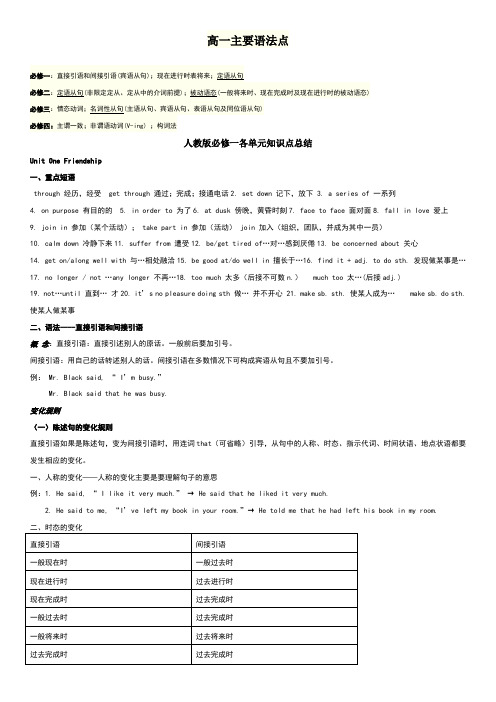
高一主要语法点人教版必修一各单元知识点总结Unit One Friendship一、重点短语through 经历,经受 get through 通过;完成;接通电话2. set down 记下,放下 3. a series of 一系列4. on purpose 有目的的5. in order to 为了6. at dusk 傍晚,黄昏时刻7. face to face 面对面8. fall in love 爱上9. join in 参加(某个活动); take part in 参加(活动) join 加入(组织,团队,并成为其中一员)10. calm down 冷静下来11. suffer from 遭受12. be/get tired of…对…感到厌倦13. be concerned about 关心14. get on/along well with 与…相处融洽15. be good at/do well in 擅长于…16. find it + adj. to do sth. 发现做某事是…17. no longer / not …any longer 不再…18. too much 太多(后接不可数n.) much too 太…(后接adj.)19. not…until 直到… 才20. it’s no pleasure doing sth 做… 并不开心 21. make sb. sth. 使某人成为… make sb. do sth. 使某人做某事二、语法----直接引语和间接引语概念:直接引语:直接引述别人的原话。
一般前后要加引号。
间接引语:用自己的话转述别人的话。
间接引语在多数情况下可构成宾语从句且不要加引号。
例:Mr. Black said, “ I’m busy.”Mr. Black said that he was busy.变化规则(一)陈述句的变化规则直接引语如果是陈述句,变为间接引语时,用连词that(可省略)引导,从句中的人称、时态、指示代词、时间状语、地点状语都要发生相应的变化。
人教版高中英语必修一至必修四语法

人教版高中英语必修一至必修四语法(总18页)-CAL-FENGHAI.-(YICAI)-Company One1-CAL-本页仅作为文档封面,使用请直接删除1.名词性从句在句子中起名词作用的句子叫名词从句 (Noun Clauses)。
名词从句的功能相当于名词词组, 它在复合句中能担任主语、宾语、表语、同位语、介词宾语等,因此根据它在句中不同的语法功能,名词从句又可分别称为主语从句、宾语从句、表语从句和同位语从句。
一、引导名词性从句的连接词引导名词性从句的连接词可分为三类:连词:that(无任何词意)whether,if(均表示“是否”表明从句内容的不确定性)as if ,as though(均表示“好像”,“似乎”)以上在从句中均不充当任何成分连接代词:what, whatever, who, whoever, whom,whose, which.whichever,whomever连接副词:when, where, how, why不可省略的连词:1. 介词后的连词2. 引导主语从句和同位语从句的连词不可省略。
That she was chosen made us very happy.We heard the news that our team had won.比较:whether与if 均为"是否"的意思。
但在下列情况下,whether 不能被if 取代:1. whether引导主语从句并在句首2. 引导表语从句3. whether从句作介词宾语4. 从句后有"or not"Whether he will come is not clear.大部分连接词引导的主语从句都可以置于句末,用 it充当形式主语。
二. 主语从句作句子主语的从句叫主语从句。
主语从句通常由从属连词that,whether,if和连接代词what,who,which,whatever,whoever以及连接副词how,when,where,why等词引导。
人教版高中英语必修一语法知识点总结
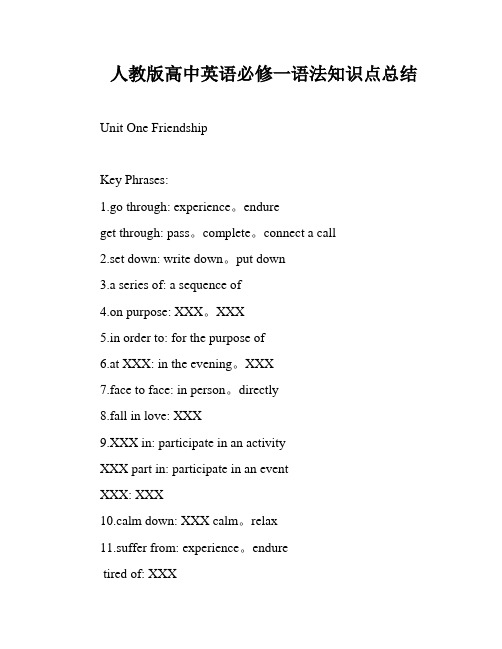
人教版高中英语必修一语法知识点总结Unit One FriendshipKey Phrases:1.go through: experience。
endureget through: pass。
complete。
connect a call2.set down: write down。
put down3.a series of: a sequence of4.on purpose: XXX。
XXX5.in order to: for the purpose of6.at XXX: in the evening。
XXX7.face to face: in person。
directly8.fall in love: XXX9.XXX in: participate in an activityXXX part in: participate in an eventXXX: XXX10.calm down: XXX calm。
relax11.suffer from: experience。
enduretired of: XXX13.be concerned about: care about。
be interested in14.get on/along well with: have a good nship with15.be good at/do well in: be skilled at。
perform well in16.find it + adj。
to do sth.: discover that doing something is…17.XXX: no more。
not anymore18.too much: an excessive amount (used with uncountable nouns)much too: too much (used with adjectives)19.not…until: not until…20.it’XXX: it’s XXX do…21.make sb。
(完整版)人教高中英语必修一各单元知识点汇总

(非常全)人教高中英语必修一各单元知识点汇总主要内容包括:一、重点短语二、语法目录:Unit One FriendshipUnit two English around the worldUnit 3 Travel journalUnit four EarthquakesUnit 5 Nelson Mandela – a modern heroUnit One Friendship一、重点短语1.go through 经历,经受get through 通过;完成;接通电话2. set down 记下,放下3. a series of 一系列4. on purpose 有目的的5. in order to 为了6. at dusk 傍晚,黄昏时刻7. face to face 面对面8. fall in love 爱上9. join in 参加(某个活动);take part in 参加(活动)join 加入(组织,团队,并成为其中一员)10. calm down 冷静下来11. suffer from 遭受12. be/get tired of…对…感到厌倦13. be concerned about 关心14. get on/along well with 与…相处融洽15. be good at/do well in 擅长于…16. find it + adj. to do sth. 发现做某事是…17. no longer / not …any longer 不再…18. too much 太多(后接不可数n.)much too 太…(后接adj.)19. not…until 直到…才20. it’s no pleasure doing sth 做…并不开心21. make sb. sth. 使某人成为…make sb. do sth. 使某人做某事二、语法----直接引语和间接引语概念:直接引语:直接引述别人的原话。
人教版高中英语必修一语法点

人教版高中英语必修一语法点篇一:人教新课标高中英语必修一知识点详细归纳总结人教版新课标高中英语必修一知识点归纳总结(按单元分)新课标必修1 Unit1 Friendship重点词组:be good to对….友好add up 合计another time 改时间get sth done 使…被做 calm down 镇定下来 have got to 不得不walk the dog 遛狗make a list of列出hide away 躲藏;隐藏be concerned about 关心;挂念 share sth with sb 和某人分享某物go through 经历;仔细检查 set down 放下;记下 a series of 一系列;一套be crazy about 对…着迷on purpose 故意 in order to/ so as to 为了face to face 面对面地get along with 与…相处 pack up 收拾,打理行装according to 按照;根据…所说 have trouble with sb/sth 同某人闹意见;做…有困难 municate with sb 和…交际throw away the friendship 放弃/终止友谊try out 试验;试用 join in 参加(活动) far and wide到处look to sth 注意,留心某事 fall in love 相爱 ignorant of无知的cheat sb (out) of sth 骗取某人某物 have the/a habit of doing sth 有做…的习惯句子归纳:1.I wonder if… 我想知道是否….2. It’s because… 这是因为…. 此从句中because不能用since或as 代替3. What do you think a good friend should be like? 你认为一个好朋友应该是什么样的呢?4. While walking the dog, you were careless and it got loose and was hit by a car.=While you were walking the dog, …在遛狗时,你不小心让狗挣脱了绳子,结果狗被车撞了。
高中英语新人教版必修一全册语法汇总(分单元编排)
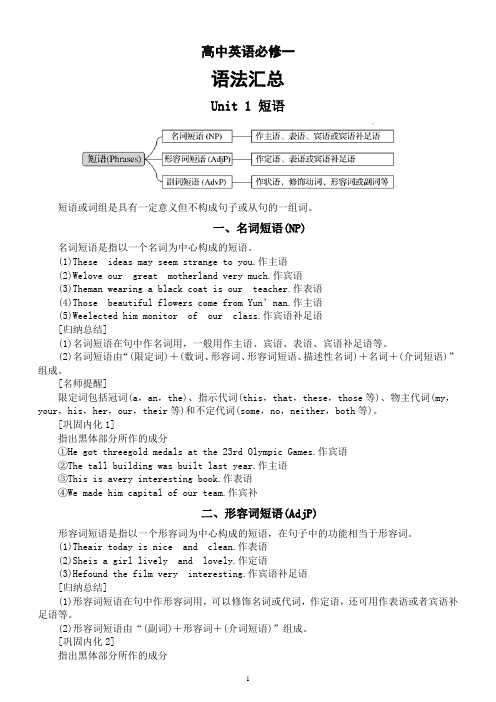
高中英语必修一语法汇总Unit 1 短语短语或词组是具有一定意义但不构成句子或从句的一组词。
一、名词短语(NP)名词短语是指以一个名词为中心构成的短语。
(1)These ideas may seem strange to you.作主语(2)Welove our great motherland very much.作宾语(3)Theman wearing a black coat is our teacher.作表语(4)Those beautiful flowers come from Yun’nan.作主语(5)Weelected him monitor of our class.作宾语补足语[归纳总结](1)名词短语在句中作名词用,一般用作主语、宾语、表语、宾语补足语等。
(2)名词短语由“(限定词)+(数词、形容词、形容词短语、描述性名词)+名词+(介词短语)”组成。
[名师提醒]限定词包括冠词(a,an,the)、指示代词(this,that,these,those等)、物主代词(my,your,his,her,our,their等)和不定代词(some,no,neither,both等)。
[巩固内化1]指出黑体部分所作的成分①He got threegold medals at the 23rd Olympic Games.作宾语②The tall building was built last year.作主语③This is avery interesting book.作表语④We made him capital of our team.作宾补二、形容词短语(AdjP)形容词短语是指以一个形容词为中心构成的短语,在句子中的功能相当于形容词。
(1)Theair today is nice and clean.作表语(2)Sheis a girl lively and lovely.作定语(3)Hefound the film very interesting.作宾语补足语[归纳总结](1)形容词短语在句中作形容词用,可以修饰名词或代词,作定语,还可用作表语或者宾语补足语等。
人教版高中英语必修三1-5单元重点词汇和语法(完整版)
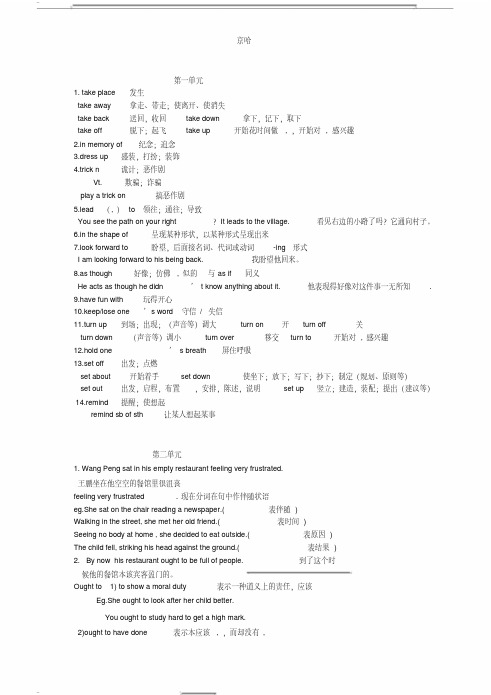
第一单元1. take place 发生take away 拿走、带走;使离开、使消失take back 送回,收回take down 拿下,记下,取下take off 脱下;起飞take up 开始花时间做 , ,开始对 , 感兴趣2.in memory of 纪念;追念3.dress up 盛装,打扮;装饰4.trick n 诡计;恶作剧Vt. 欺骗;诈骗play a trick on 搞恶作剧5.lead (, ) to 领往;通往;导致You see the path on your right ?It leads to the village. 看见右边的小路了吗?它通向村子。
6.in the shape of 呈现某种形状,以某种形式呈现出来7.look forward to 盼望,后面接名词、代词或动词-ing 形式I am looking forward to his being back. 我盼望他回来。
8.as though 好像;仿佛 , 似的与 as if 同义He acts as though he didn ’ t know anything about it. 他表现得好像对这件事一无所知.9.have fun with 玩得开心10.keep/lose one ’s word 守信 / 失信11.turn up 到场;出现;(声音等)调大turn on 开turn off 关turn down (声音等)调小turn over 移交turn to 开始对 , 感兴趣12.hold one ’ s breath 屏住呼吸13.set off 出发;点燃set about 开始着手set down 使坐下;放下;写下;抄下;制定(规划、原则等)set out 出发,启程,布置,安排,陈述,说明set up 竖立;建造,装配;提出(建议等)14.remind 提醒;使想起remind sb of sth 让某人想起某事第二单元1. Wang Peng sat in his empty restaurant feeling very frustrated.王鹏坐在他空空的餐馆里很沮丧feeling very frustrated . 现在分词在句中作伴随状语eg.She sat on the chair reading a newspaper.( 表伴随 )Walking in the street, she met her old friend.( 表时间 )Seeing no body at home , she decided to eat outside.( 表原因 )The child fell, striking his head against the ground.( 表结果 )2. By now his restaurant ought to be full of people. 到了这个时候他的餐馆本该宾客盈门的。
人教版高中英语必修一知识点整理

~1. 语法:直接引语和间接引语(1)陈述句和疑问句friendship2.阅读及语言点:a.Anne’s best friend3.写作:建议信4.巩固练习Period2: language pointsPeriod3: using languagePeriod4:writingPeriod5:quiz语法直接引语和间接引语1. 直接引语在改为间接引语时,时态需要做相应的调整。
eg: “I broke your CD player.” (一般过去时改成过去完成时)He told me he had broken my CD player.Jenny said, “I have lost a book.”(现在完成时改成过去完成时)Jenny said she had lost a book.Mum said, “I’ll go to see a friend.”(一般将来时改成过去将来时)Mum said she would go to see a friend.过去完成时保留原有的时态He said, “We hadn’t finished our homework.”He said they hadn’t finished their homework.注意直接引语是客观真理,过去进行时,时态不变。
2.在直接引语变间接引语时,如果从句中的主语时第一人称或被第一人称所修饰,从句中的人称要按照主句中主语的人称变化。
如:Mary said, “My brother is an engineer.”Mary said her brother was and engineer.3.直接引语如果是反意疑问句,选择疑问句或一般疑问句,间接引语应改为由whether或if引导的宾语从句。
如:He said, “Can you run, Mike?”He asked Mike whether/if he could run.4. 直接引语如果是祈使句,间接引语应改为“tell(ask, order, beg等) * (not) to do sth.”句型。
高中英语新人教版必修三Unit 5语法汇总(过去将来时+情态动词)
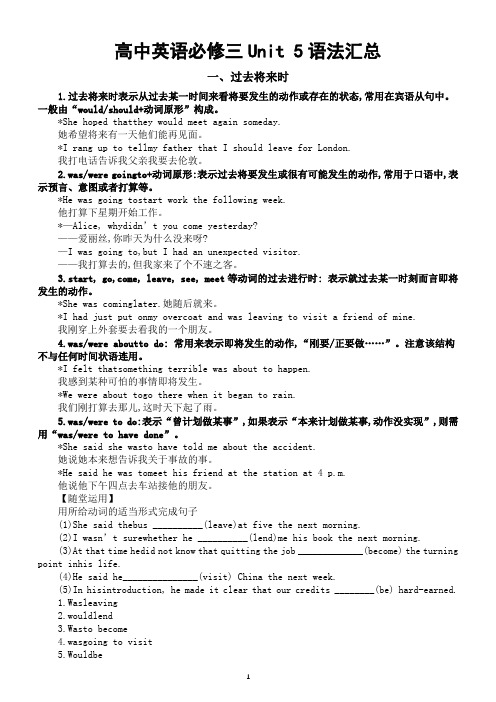
高中英语必修三Unit 5语法汇总一、过去将来时1.过去将来时表示从过去某一时间来看将要发生的动作或存在的状态,常用在宾语从句中。
一般由“would/should+动词原形”构成。
*She hoped thatthey would meet again someday.她希望将来有一天他们能再见面。
*I rang up to tellmy father that I should leave for London.我打电话告诉我父亲我要去伦敦。
2.was/were goingto+动词原形:表示过去将要发生或很有可能发生的动作,常用于口语中,表示预言、意图或者打算等。
*He was going tostart work the following week.他打算下星期开始工作。
*—Alice, whydidn’t you come yesterday?——爱丽丝,你昨天为什么没来呀?—I was going to,but I had an unexpected visitor.——我打算去的,但我家来了个不速之客。
3.start, go,come, leave, see, meet等动词的过去进行时: 表示就过去某一时刻而言即将发生的动作。
*She was cominglater.她随后就来。
*I had just put onmy overcoat and was leaving to visit a friend of mine.我刚穿上外套要去看我的一个朋友。
4.was/were aboutto do: 常用来表示即将发生的动作,“刚要/正要做……”。
注意该结构不与任何时间状语连用。
*I felt thatsomething terrible was about to happen.我感到某种可怕的事情即将发生。
*We were about togo there when it began to rain.我们刚打算去那儿,这时天下起了雨。
高中英语新人教版知识点整理(必修一+必修二)(分单元编排)

高中英语必修一知识点整理U1Teenager life【四会词汇】volunteer /debate/prefer/content/challenge/confusing/recommend/advanced/obviously/solution/focus/schedule/quitfluent/responsible...【词组】be addicted to /sign up (for)/focus on /attract sb.to sth.be scheduled to do sth./a solution to …/have/take responsibility forbe responsible for sb/It is obvious that…/in advance/advanced technology/recommend sb. as.../recommend sb. to do sthprefer to do…rather than do/........【句型句式】1.so that引导目的状语从句2.Studying hard isn't always fu n…动名词(短语)作主语时,谓语动词要用单数形式3.在it作形式主语的句子中,真正的主语可以是不定式(短语)、动名词(短语)或从句4.make+宾语+宾语补足语【语法】名词短语、形容词短语、副词短语U2 Travelling around【四会词汇】contact/apply /amazing /amazed /unique/destination/arrangement /extremely/narrow/accommodation /admire /official /comment//credit/request /visa/economic/transport hike/tomb /unearth...【词组】apply for /Check out/Other than /in my view/put up/put down/put offBe based on/Make up/Be requested to do/credit card/lose one’s sight/comment on arrange for sb. to do sth/be recognized as/admire sb.for( doing)sth/.make contact with sb....【句型句式】1.as引导的时间状语从句2.until作介词和连词的用法3.现在分词(短语)作结果状语4.which引导的非限制性定语从句【语法】现在进行时表示将来U3 Sports and fitness【四会词汇】fitness /event /ski /host /track /sweat/legend/honour/determination /injure compete /pretend/audience/error/positive/championship /negative/pressure/cheat/legendgraceful /rather ....【词组】make it/make a difference/even if/though、fair play/compare…with/fall apartIn honor of/ give up/in the way/ by the way /fall down /speak highly of sb.../.come along...【句型句式】1.提建议常用句型Why not do sth.?2.here/there/now/then引起的完全倒装句3. even if/though 引导让步状语从句【语法】反义疑问句U4 Natural Disasters【四会词汇】disasters/rescue/ damage /destroy/affect /shelter /crack /shockTrap/bury/revive/unify/context/supply/emergency // summary ...【词组】it strikes sb. that…某人突然想到/crash into撞到……上/as usual和往常一样as if似乎;好像;仿佛/the number of……的数量/nothing but只有……/blow…away把……刮走、in the open air露天;在户外/on hand现有(尤指帮助)/carry out执行过着……的生活、out of gratitude出于感激....【句型句式】1.as if/though 引导的从句2.Leave +宾语+宾补【语法】限定性定语从句--关系代词U5 Languages around the world【四会词汇】native/attitude/despite/based /variety/major /regard /appreciatestruggle /equal/demand /description /relate ...【词组】refer to提及/date back(to...)追溯(到……)/point of view 观点/the attitude to/towards ……对……的态度/pay attention to /be of great importance /be known for/lead to /be connected with /play a...role in /be senior to / compare...with...aside from ...【句型句式】1.This/That is/was a time when...这是一个……的时期2.no matter+特殊疑问词(如who/what/where/when等)”均可引导让步状语从句3.as 引导状语从句,意为“随着”4.the+比较级, the+比较级越……,就越……5.动词+疑问词+to do 结构【语法】关系副词when/where/why引导的定语从句高中英语必修二知识点整理U1 Culturalheritage【四会词汇】preserve,application,balance,protest,likely, limit,prevent,loss,contribution,issue,conduct,donate,disappear,attempt,worthwhile,professional,forgive,quality,comparison,contrast.....【词组】take part in, give way to, keep balance,lead to,make a proposal, turn to,prevent...from, donate...to...等【句型句式】as 引导状语从句Not only 倒装句It ‘s said/reported that ........【语法】限制性定语从句“介词+关系代词”结构引导的定语从句U2 wildlife protection【四会词汇】concern vt.使忧虑/intend/remind v. 提醒,使某人想起/measure n. & v.searchv. 寻找/immediately adv.立刻/species n.物种./extinction n.灭绝/habitat n.(动植物的)生活环境;栖息地/average n.平均数/authority n.官方;当权/reserve.....【词组】be concerned with ...与……有关/die out灭绝/intend to do/doing sth.打算做某事take measures (to do sth.)“采取措施(做某事/measure sb./sth. against sb./sth.将……与……作比较/a mass of/ masses of 大片的/adopt to 收养/on average平均/.aware of 意识到...【句型句式】1.that引导定语从句2.Only前置,句子进行部分倒装3.for作为并列连词表示原因,用来引出并列分句,解释说话人为什么会说前面的话【语法】现在进行时的被动语态If 引导的真实条件状语从句一般现在时的被动语态U3 The internet【四会词汇】blogger/stuck/privacy/troll/cyberbully/embarrassing/define/blog/blog postChat/search engine/software/network/surf/charity/province/resident/ batteryButton/click/file/database/guideline....【词组】the global village/ raise money/online safety/ go through/a search engine/ a fitness planstream movies copy the file/look up information/ take steps/a nonsense name /bank accountthe key information get in shape/follow the rules/ stay safe/catch one’s attention /a thing or twowait in line/give out/develop an illness/ make trouble....【句型句式】“now that”经常用于句首,表示提醒他人注意,翻译成“因为”no matter+特殊疑问词”形成的连词可以引导让步状语从句【语法】现在完成时的被动语态U4 History and traditions【四会词汇】county/snack/roll/pub/wine/beer/military/landscape /cattle/nearby/oceanMansion/cemetery/descendant/heel/chief/puzzle/currency/conquer/fascinating/court yard/feastDot/roar/scent/stew/sensory/striking/Transition.....【词组】well-organized很有条理的/break away from摆脱,脱离/historic buildings历史建筑take over/接管/cultural traditions文化传统/as well as也,和/a scent of一种…味道keep your eyes open关注/as to至于/date back to 追溯到/through the history在历史上get charged充电/chief advantages主要优点/The amount of …的数量........【句型句式】“it”做形式主语,“to do”不定式做真正主语的句式结构过去分词,作为修饰语,起补充说明作用【语法】过去分词作定语和定语补足语U5 Music【四会词汇】composition/virtual/opportunity/enable/original/previous/phenomenon/Capable/relief/impact/aim/assume/addition/satisfaction/various/....【词组】absorbed in sth/ set sth up /fall in love 爱上/reflect on认真思考/be aimed to do sth. 目标在于/in addition to 除…之外/heart and soul 全心全意地/enable sb, to do sth.使某人能够做某事/in reaction to sth. 对…的反应/be equipped with 配有/have animpact\effect\influence on/...【句型句式】As it turned out,....../As is mentioned above,....It’s my honour to.......【语法】过去分词作表语和状语。
人教版高中英语必修一知识点总结
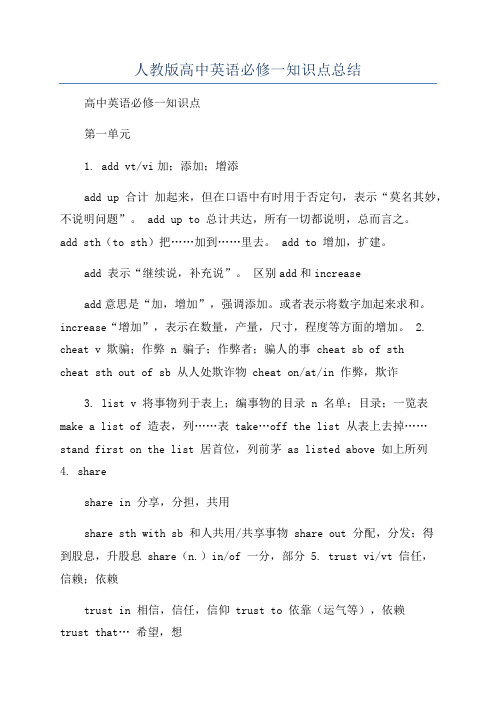
人教版高中英语必修一知识点总结高中英语必修一知识点第一单元1. add vt/vi加;添加;增添add up合计加起来,但在口语中有时用于否定句,表示“莫名其妙,不说明问题”。
add up to 总计共达,所有一切都说明,总而言之。
add sth(to sth)把……加到……里去。
add to 增加,扩建。
add 表示“继续说,补充说”。
区别add和increaseadd意思是“加,增加”,强调添加。
或者表示将数字加起来求和。
increase“增加”,表示在数量,产量,尺寸,程度等方面的增加。
2. cheat v 欺骗;作弊 n 骗子;作弊者;骗人的事 cheat sb of sthcheat sth out of sb 从人处欺诈物 cheat on/at/in 作弊,欺诈3. list v 将事物列于表上;编事物的目录 n 名单;目录;一览表make a list of 造表,列……表take…off the list 从表上去掉…… stand first on the list 居首位,列前茅 as listed above 如上所列4. shareshare in 分享,分担,共用share sth with sb 和人共用/共享事物 share out 分配,分发;得到股息,升股息 share(n.)in/of 一分,部分 5. trust vi/vt 信任,信赖;依赖trust in 相信,信任,信仰 trust to 依靠(运气等),依赖trust that… 希望,想5)suffer vt/vi 遭受,受到,蒙受;受痛苦,受折磨,受惩罚,受损伤 suffer from 受……伤害;患……病痛注意:suffer 和 suffer from 都不能用于被动语态6)calm vt/vi/adj. 使平静;使镇定。
平静的,镇静的,沉着的。
calm down 平静下来,镇定下来quite指人对外界事物感触的安静。
人教版高中英语语法知识点
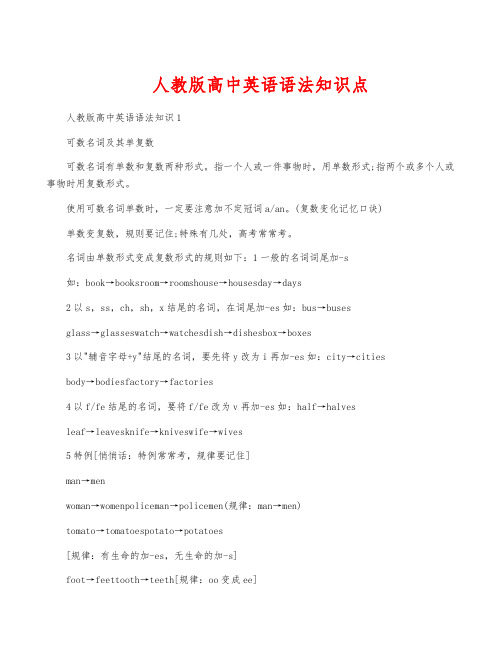
人教版高中英语语法知识点人教版高中英语语法知识1可数名词及其单复数可数名词有单数和复数两种形式。
指一个人或一件事物时,用单数形式;指两个或多个人或事物时用复数形式。
使用可数名词单数时,一定要注意加不定冠词a/an。
(复数变化记忆口诀)单数变复数,规则要记住;特殊有几处,高考常常考。
名词由单数形式变成复数形式的规则如下:1一般的名词词尾加-s如:book→booksroom→roomshouse→housesday→days2以s,ss,ch,sh,x结尾的名词,在词尾加-es如:bus→busesglass→glasseswatch→watchesdish→dishesbox→boxes3以"辅音字母+y"结尾的名词,要先将y改为i再加-es如:city→citiesbody→bodiesfactory→factories4以f/fe结尾的名词,要将f/fe改为v再加-es如:half→halvesleaf→leavesknife→kniveswife→wives5特例[悄悄话:特例常常考,规律要记住]man→menwoman→womenpoliceman→policemen(规律:man→men)tomato→tomatoespotato→potatoes[规律:有生命的加-es,无生命的加-s]foot→feettooth→teeth[规律:oo变成ee]sheep,Chinese,Japanese单、复数同形。
[规律:单复同形:变复数时词形不可变]people表示复数意义,要求谓语动词用复数;people加上-s以后,peoples通常指“多个民族”。
[规律:集体名词只做复数:people很特殊,谓语用复数]人教版高中英语语法知识2介词的5种用法英语经常用介词来表示词与词之间的关系1)at表示在某一时间点:at3o’clock2)in表示在某一时间段内的某一或某些点:in2004in 表示在某段时间的结束点:I’llseeyouagaininaweek.during表示某一时间段内自始至终:duringthefirstperiodon表示在某一day/date或其中的某一段:onMonday,onSundaymorningat表示在某处(而非它处):atschoolin表示在内部或某个范围内:intheofficeon表示在上面与某平面接触:onthetableoutside表示在某个范围之外:outsideworldunder表示在比某个位置低的地方或在某表面之下:underachairby表示靠近或接近:bythewindowbecauseof表示因为或以…为理由:becauseofmyfatherfor表示动作或活动的目的、目标或意图:forsaleoutof表示起源、来源或原因:outofduty方式1)with表示以…方式:withskill2)in表示以某种方式:inFrench,incash,inthiswayby表示方法、手段:bythebackroad,bybus,byworkinghardon表示运送方式:onatrain,onfootin表示途径或材料:inoils人教版高中英语语法知识3情态动词一、can和could1、can的用法(1)表示体力和脑力方面的能力。
- 1、下载文档前请自行甄别文档内容的完整性,平台不提供额外的编辑、内容补充、找答案等附加服务。
- 2、"仅部分预览"的文档,不可在线预览部分如存在完整性等问题,可反馈申请退款(可完整预览的文档不适用该条件!)。
- 3、如文档侵犯您的权益,请联系客服反馈,我们会尽快为您处理(人工客服工作时间:9:00-18:30)。
高中必修一到必修五主要语法点必修一:直接引语和间接引语(宾语从句);现在进行时表将来;定语从句必修二:定语从句(非限定定从、定从中的介词前提);被动语态(一般将来时、现在完成时及现在进行时的被动语态) 必修三:情态动词;名词性从句(主语从句、宾语从句、表语从句及同位语从句)必修四:主谓一致;非谓语动词(V-ing) ;构词法必修2 第一单元,非限制性定语从句的第二单元一般将来时的主被动第三单元现在完成时的主被动第四单元现在进行时的主被动第五单元介词+which/whom的用法必修3 一二单元情态动词的用法三单元宾语从句和表语从句四单元主语从句五单元同位语从句必修4 第一单元主谓一致第二单v-ing作主语和宾语的用法第三单元v-ing作表语,定语和宾语补足语第四单元v-ing作状语第五单元构词法必修5 第一单元过去分词作定语和表语第二单元过去分词作宾语补足语第三单元过去分词作状语第四单元倒装句第五单元省略句必修一各单元知识点总结Unit One Friendship一、重点短语1.go through 经历,经受get through 通过;完成;接通电话2. set down 记下,放下3. a series of 一系列4 on purpose 有目的的5. in order to 为了6. at dusk 傍晚,黄昏时刻7. face to face 面对面8. fall in love 爱上9. join in 参加(某个活动);take part in 参加(活动)join 加入(组织,团队,并成为其中一员)10. calm down 冷静下来11. suffer from 遭受12. be/get tired of…对…感到厌倦13. be concerned about 关心14. get on/along well with 与…相处融洽15. be good at/do well in 擅长于…16. find it + adj. to do sth. 发现做某事是…17. no longer / not …any longer 不再…18. too much 太多(后接不可数n.)much too 太…(后接adj.)19. not…until 直到…才20. it’s no pleasure doing sth 做…并不开心21. make sb. sth. 使某人成为…make sb. do sth. 使某人做某事二、语法----直接引语和间接引语概念:直接引语:直接引述别人的原话。
一般前后要加引号。
间接引语:用自己的话转述别人的话。
间接引语在多数情况下可构成宾语从句且不要加引号。
例:Mr. Black said, “ I’m busy.”Mr. Black said that he was busy.变化规则(一)陈述句的变化规则直接引语如果是陈述句,变为间接引语时,用连词that(可省略)引导,从句中的人称、时态、指示代词、时间状语、地点状语都要发生相应的变化。
人称的变化——人称的变化主要是要理解句子的意思例:1. He said, “ I like it very much.”→He said that he liked it very much.2. He said to me, “I’v left my book in your room.”→He told me that he had left his book in my room.时态的变化例:“I don’t want to set down a series of facts in a diary,” said Anne.→Anne said that she didn’t want to set down a series of facts in a diary.The boy said, “I’m using a knife.”→The boy said that he was using a knife.▲注意:如果直接引语是客观真理,变为间接引语时,时态不变,如:He said, “Light travels much faster than sound.”He said that light travels much faster than sound.指示代词、时间状语、地点状语和动词的变化(二) 祈使句的变化规则如果直接引语是祈使句,变为间接引语时,要将祈使句的动词原形变为带to的不定式,并根据句子意思在不定式前加上tell/ask/order等动词,如果祈使句是否定句,在不定式前面还要加上not。
例:The hostess said to us, “Please sit down.”→The hostess asked us to sit down.He said, “Don’t make so much noise, boys.”→He told the boys not to make so much noise.(三)疑问句的变化规则如果直接引语是疑问句,变为间接引语时要把疑问句语序变为陈述句语序,句末用句号。
一般疑问句:如果直接引语是一般疑问句,变为间接引语时,谓语动词是say或said时,要改为ask 或asked,原问句变为由if/whether 引导的宾语从句。
例:“Do you think a diary can become your friend?” the writer says.→The writer asks us if we think a diary can become our friend.2) 特殊疑问句:如果间接引语是特殊疑问句,变为间接引语时,仍用原来的引导词,但疑问句要变为陈述句。
例:“What do you want?” he asked me.→He asked me what I wantedUnit two English around the world一、重点短语1. be different from 与…不同be the same as 与…一样2. one another 相互,彼此(=each other)3. official language 官方语言4. at the end of 在…结束时5. because of 因为(后接名词或名词性短语)because 因为(后接句子)6. native speakers 说母语的人7. be based on 根据,依据8. at present 目前;当今9. especially 特别,尤其specially 专门地10. make use of 利用…make the best of 充分利用…11. a large number of 大量的,很多(作主语,谓语动词用复数)the number of …的数量(作主语,谓语动词用单数)12. in fact = actually= as a matter of fact 事实上13. believe it or not 信不信由你14. there is no such thing as…没有这样的事…15. be expected to …被期待做某事16. play a part/role in …在…起作用17. make lists of…列清单18. included 包括(前面接包括的对象)Including包括(后接包括的对象)19. command sb. to do sth. 命令某人去做某事command + that 从句(从句用should+V原)20. request sb. to do sth. 要求某人做某事request + that 从句(从句用should+V原)二、语法----英语中的命令(command)语气和请求(request)语气命令语气:表示直接命令某人做某事,语气比较重,不怎么礼貌,一般用于上级对下级例:1. “ Look at the example”, the teacher said to us.2. Open the window!请求语气:表示请求某人做某事,语气比较缓和,非常礼貌例:1. “ Would you like to see my flat?” She asked.2. Would you please open the window?Unit 3 Travel journal一、重点短语1. travel----泛指旅行journey----指长时间长距离的陆上旅行voyage----指长距离的水上旅行,也可以指乘飞机旅行trip----常指短时间短距离的旅行tour----指周游,巡回旅游,2. prefer to 更加喜欢,宁愿prefer A to B 比起B,更喜欢Aprefer doing to doing 比起做…,宁愿做…prefer to do rather than do 与其做…, 不如…3. flow through 流过,流经4. ever since 自从5. persuade sb. to do sth. 说服某人做某事6. be fond of 喜欢7. insist on doing 坚持做某事insist + that 从句(用should+ V原)8. care about 关心9. change one’s mind 改变想法10. altitude 高度attitude 态度,看法11. make up one’s mind to do下定决心做某事= decide to do = make a decision to do12. give in 让步,屈服give up 放弃13. be surprised to …对…感到惊奇to one’s surprise 令某人惊讶的是…14. at last = finally = in the end 最终15. stop to do 停下来去做某事stop doing 停止做某事16. as usual 像往常一样17. so…that如此…以至于…So + adj + a/an + n. + thatSuch + a/an +adj. + n. + that18. be familiar with 对…熟悉(人作主语)be familiar to 为…所熟悉(物作主语)二、语法:现在进行时表将来现在进行时表将来,表示最近按计划或安排要进行的动作,常见的现在进行时表将来的动词有:come/ go / leave/ arrive / travel / take / stay/ do等.例:1. I’m coming. 我就来2. what are you doing next Sunday ? 你下个星期天做什么?3. I hear that you are travelling along Mekong River. 我听说你将沿湄公河旅行4. Where are you staying at night? 你们晚上待在哪里/Unit four Earthquakes一、重点短语1. right away 立刻,马上(= at once = in no time)2. asleep 睡着的;熟睡地(fall asleep 入睡)sleep 睡;睡眠sleepy 犯困的3. it seems that/ as if …看来好像…;似乎4. in ruins 成为废墟5. the number of …的数量(谓语动词用单数)a number of 大量(谓语动词用复数)6. rescue workers 营救人员Come to one’s rescue 营救某人7. be trapped 被困8. how long 多长时间how often 多久,指平率how soon 还要多久(用于将来时当中,用in+时间段回答)9. hundreds of thousands of 成千上万的10. dig out 挖出11. shake----泛指“动摇,震动”,常指左右、上下动摇,也可以指人“震惊,颤抖”例:1. She felt the earth shaking under him.2. She was shaken with anger.quake---- 指较强烈的震动,如地震例: The building quaked on its foundationTremble---- 指人由于寒冷、恐惧、不安等引起的身体的抖动或声音的颤抖例:Suddenly I saw her lips begin to tremble and tears begin to flow down her cheeks.Shiver---- 多指寒冷引起的颤抖、哆嗦例:A sudden gust of cold wind made me shiver.12. rise (rose—risen)---- vi, 上升;升起,无被动语态;give rise to 引起Raise(raised—raised)---- vt, 举起;筹集;养育Arise ( arose—arisen)----vt, 出现(常指问题或现象)13. injure---- 常指因意外事故造成的损伤,也可以指感情上名誉上的伤害例:He was injured in a car accident.harm---- 泛指“伤害,损害”,既可以指有生命的,也可以指无生命的例:1. He was afraid that his fury would harm the child.2. His business was harmed for some reason.hurt---- 既可以指肉体上的伤害,也可以指精神上的伤害例:1. She hurt her leg when she fell.2. He felt hurt at your word.wound---- 一般指枪伤、刀伤等在战场上受的伤例:The bullet wounded him in the arm.14. be prepared for …= make preparations for…为…做准备15. in one’s honor 向…表示敬意;为纪念Be/ feel honored to do …做…感到很荣幸16. make /give/ deliver a speech 发言opening speech 开幕词17. give/ provide shelter to …向…提供庇护所seek shelter from…躲避18. happen to + n./ pron. 遭遇,发生happen to do sth. 偶然;碰巧happen ----指偶然发生take place----指事先计划好的事情发生二、语法----定语从句概念:在复合句中,修饰名词或代词的从句叫做定语从句。
